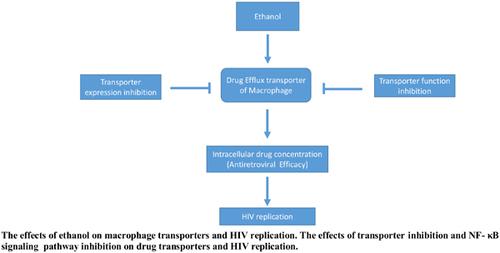Current HIV Research ( IF 0.8 ) Pub Date : 2021-02-28 , DOI: 10.2174/1570162x18666201008143833 Ying Mu 1 , Theodore J Cory 1

|
Background: Ethanol has been shown to increase oxidative stress, drug efflux transporter expression, and promote HIV progression. Macrophages, which express drug efflux transporters, serve as an essential sanctuary site for HIV. The antiretroviral drug lopinavir, a protease inhibitor, is a substrate of the drug efflux transporters P-glycoprotein and multidrug resistance-associated protein 1. The NF-κB signaling pathway is associated with inflammation and drug efflux transporter expression.
Objective: To examine the effects of ethanol on drug efflux transporters and HIV replication of macrophages and develop strategies to increase the efficacy of the protease inhibitor.
Methods: The expression of PGP and MRP1 was examined with western blot. The NF- κB inhibition was assessed with nuclear western blot. LC-MS/MS and p24 ELISA were used to assess intracellular LPV and viral replication.
Results: Ethanol at 40mM slightly increased drug efflux transporter PGP and MRP1 expression in activated macrophages. IKK-16, an NF- κB inhibitor, counteracted the increased transporter expression caused by ethanol exposure. MK571, an MRP1 inhibitor, and IKK-16 significantly increased intracellular LPV concentration with or without ethanol treatment. MK571 significantly increased LPV efficacy in suppressing viral replication with or without ethanol treatment. A decreasing trend and a significant decrease were observed with IKK-16+LPV treatment compared with LPV alone in the no ethanol treatment and ethanol treatment groups, respectively.
Conclusion: In activated macrophages, inhibiting drug efflux transporter MRP1 activity and reducing its expression may represent a promising approach to suppress viral replication by increasing intracellular antiretroviral concentrations. However, different strategies may be required for ethanolrelated vs. untreated groups.
中文翻译:

通过抑制活化巨噬细胞中的药物外排转运蛋白来抑制 HIV-1 病毒复制
背景:乙醇已被证明会增加氧化应激、药物外排转运蛋白表达并促进 HIV 进展。表达药物外排转运蛋白的巨噬细胞是 HIV 的重要避难所。抗逆转录病毒药物洛匹那韦是一种蛋白酶抑制剂,是药物外排转运蛋白 P-糖蛋白和多药耐药相关蛋白 1 的底物。NF-κB 信号通路与炎症和药物外排转运蛋白表达有关。
目的:检查乙醇对药物外排转运蛋白和巨噬细胞 HIV 复制的影响,并制定提高蛋白酶抑制剂功效的策略。
方法:采用蛋白质印迹法检测PGP和MRP1的表达。用核蛋白质印迹评估NF-κB抑制。LC-MS/MS 和 p24 ELISA 用于评估细胞内 LPV 和病毒复制。
结果:40mM 乙醇略微增加了活化巨噬细胞中药物流出转运蛋白 PGP 和 MRP1 的表达。IKK-16 是一种 NF-κB 抑制剂,可抵消乙醇暴露引起的转运蛋白表达增加。MK571(一种 MRP1 抑制剂)和 IKK-16 在有或没有乙醇处理的情况下显着增加细胞内 LPV 浓度。无论有没有乙醇处理,MK571 都显着提高了 LPV 在抑制病毒复制方面的功效。与单独使用 LPV 相比,在无乙醇处理组和乙醇处理组中,分别观察到 IKK-16+LPV 处理的下降趋势和显着下降。
结论:在活化的巨噬细胞中,抑制药物外排转运蛋白 MRP1 活性并降低其表达可能代表一种通过增加细胞内抗逆转录病毒浓度来抑制病毒复制的有前途的方法。然而,乙醇相关组与未处理组可能需要不同的策略。











































 京公网安备 11010802027423号
京公网安备 11010802027423号